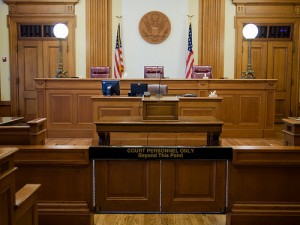Trial at Family Court – The Players
If opposing parties in a family law or divorce case cannot settle all of their issues, the case goes on to a family law trial. A trial is the most expensive and time consuming part of the legal process. However, only about 5-10% of family law cases go all the way to trial.
In a divorce, the spouses are the two parties. For a custody case, the mother and father are the two parties. In a grandparent’s rights case, it’s typically one or both grandparents against a parent.
The most typical disputed issues at trial are: child custody, parenting time, child support, spousal maintenance, property division, and debt division.
Judges alone preside over most family court trials. This is a bench trial. Divorce cases, for example, are always bench trials. On the other hand, paternity cases can be either a bench trial or a jury trial.
Trial at Family Court – Procedures
At trial, parties or their attorneys provide evidence and witness testimony. During the trial the judge collects the evidence needed to decide the issues in dispute.
Additionally, courts have formal procedural rules for providing this evidence and testimony. Judges will not receive or consider evidence that does not follow these rules. A judge does not help parties figure out the rules for themselves. In other words, parties representing themselves are held to the same standard as attorneys.
If attorneys are involved, a trial is typically the most labor intensive part of the case. Attorneys spend a great deal of time selecting and preparing exhibits, preparing witnesses, and anticipating legal issues. For this reason, legal expenses go up dramatically in preparation for a trial. Trials also tend to be the most stressful event in a case for the parties.
For these reasons, many cases settle. Parties often find going to trial to be cost-prohibitive. This is especially true if there few financial issues in dispute.
After the Trial
After the trial, a judge has 90 days to make a decision on the issues in dispute. To reach this decision, the judge applies the rules of law to the evidence received at trial.
When the judge makes a decision, he or she issues either an Order or a Judgment and Decree. The Order ends a custody case. The Judgement and Decree ends a divorce case.
However, after a judge makes his or her decision each party has 60 days if to file an appeal. In this case, the Court of Appeals has its own set of strict rules that must be followed, however that is a different topic.
If you have more questions, please review the links to the left, head back to the MN Family Law Attorney home, or visit Majeski Law. If you’re interested in retaining an attorney, please feel free to email or call using the links in the upper right.
